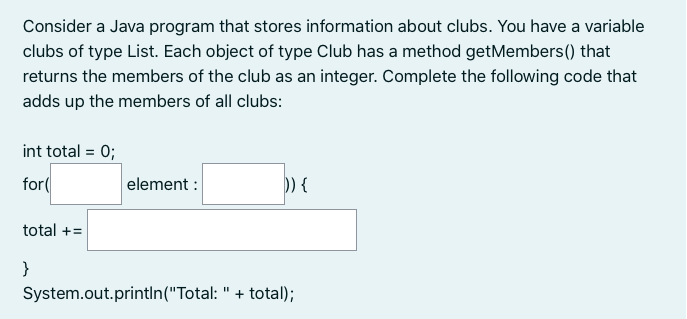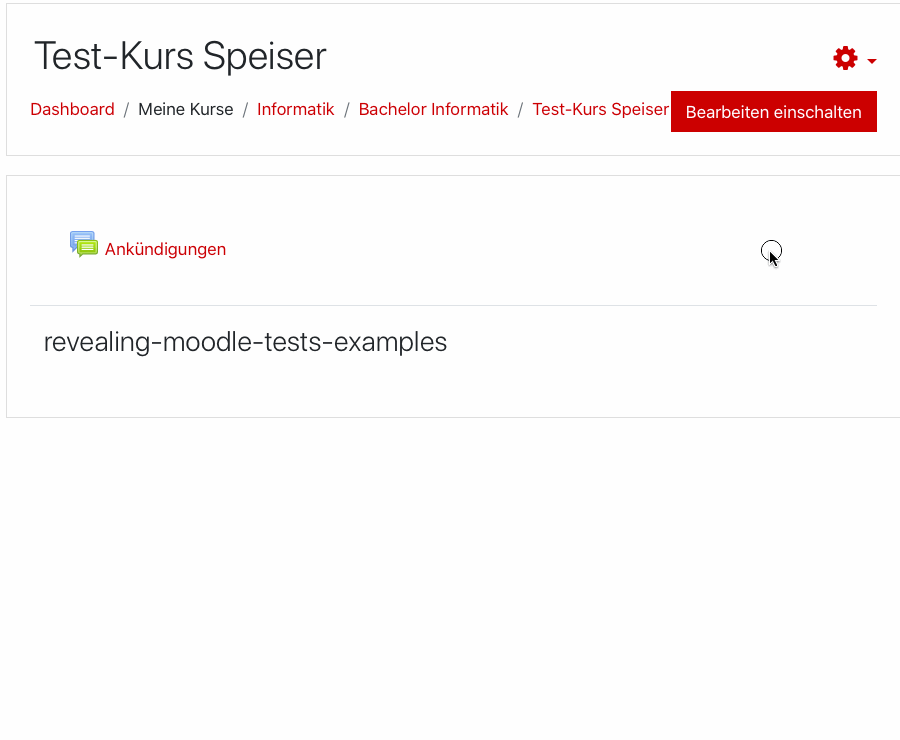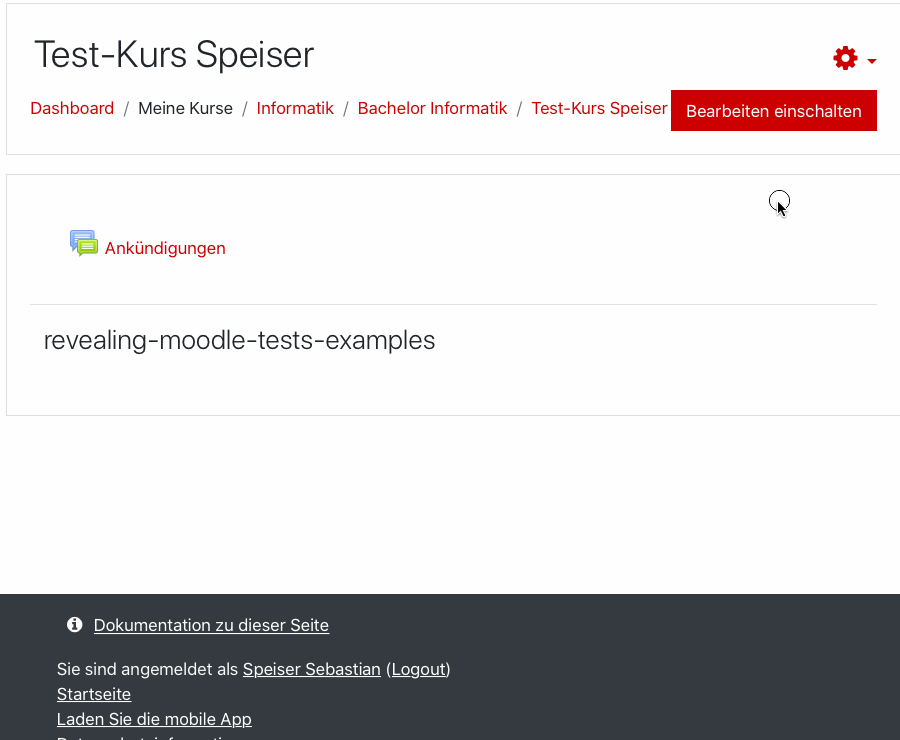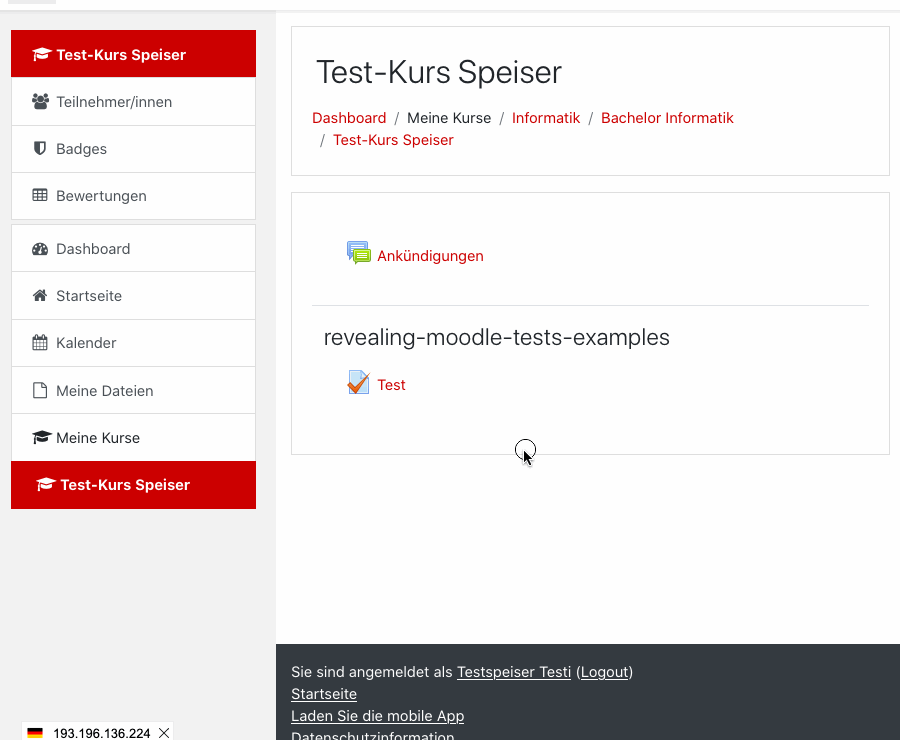Revealing Moodle Tests - every student gets a different question
Programmatically create Moodle test questions. You specify how to generate questions for a category and the library generates corresponding XML files that can be imported into Moodle. When creating a Moodle test, you can then select the number of questions that should be randomly selected of each category for each student.
Table of contents:
Install
You can get revealing-moodle-tests via npm.
$ npm i revealing-moodle-tests --save
A template project with an initialized TypeScript structure, imported dependencies and code for the example questions shown below can be found at sspeiser/revealing-moodle-tests-examples
Usage
import { RevealingMoodleTests } from 'revealing-moodle-tests';
const tests = new RevealingMoodleTests();
// Add questions, see below for more advanced examples
tests.addMultiChoice('Arithmetic statements simple', 'Please assess the following statement', {
'2 + 3 = 5': true,
'3 + 7 = 8': false,
'1 + 1 = 3': false,
'1 + 1 = 2': true
});
tests.saveTo("examples.xml")Methods for generating questions
There are currently two methods that can be used on the RevealingMoodleTests object to add questions. See below for examples.
addMultiChoice
addMultiChoice(name: string,
text: string,
statements: Record<string, boolean | string[]>): void Create a category name with one multiple choice question for each entry in statements. Each question has the question text: text, blank line, key of the statement.
There are either:
- Two answer options if the value of the statement is of type
boolean. The specified boolean value is considered as correct answer, the negation as false. - One answer option for each element if the value of the statement is of type
string[]. Mark correct answers by putting an equal sign in front of the answer string (just as in Moodle, e.g."=Correct answer")
addQuestions
addQuestions(name: string,
n: number,
qtype: "cloze" | "shortanswer",
genQuestion: () => { name?: string, text: string, answers?: string[] }): voidCreate a category name and call n times the function genQuestion which should return a question corresponding to qtype.
In case of qtype === "cloze" only the text has to specified in cloze format which already contains all answers.
In case of qtype === "shortanswer", specify the correct (and incorrect) answers.
Examples
Simple Yes-No-Questions
Simple Yes-No-Questions that are put in the same category Of course this can be done in Moodle directly but if you prefer typing over lots of mouse clicking in Moodle this is the way to go
Please note the singular statement in the question text as for each entry a new question is generated
tests.addMultiChoice('Arithmetic statements simple', 'Please assess the following statement', {
'2 + 3 = 5': true,
'3 + 7 = 8': false,
'1 + 1 = 3': false,
'1 + 1 = 2': true
});Generates 4 questions like the following:

Programmatically generated Yes-No-Questions
Better to generate the statements programatically Also we can use some helper functions for generating random values
const stmts_yesno: Record<string, boolean> = {}
for (let index = 0; index < 50; index++) {
const a = RevealingMoodleTests.randomInt(1, 100);
const b = RevealingMoodleTests.randomInt(1, 100);
const c = a + b + RevealingMoodleTests.randomInt(-1, 1);
stmts_yesno[`${a} + ${b} = ${c}`] = a + c == c;
}
tests.addMultiChoice('Arithmetic statements generated',
'Please assess the following statement',
stmts_yesno);Generates 50 questions like the following example:

Multiple Choice
If Yes-No is too simple, then we can also have more answer options Shuffle Answers is true by default so Moodle will randomly arrange the answer options
const stmts_multi: Record<string, string[]> = {}
for (let index = 0; index < 50; index++) {
const a = RevealingMoodleTests.randomInt(1, 100);
const b = RevealingMoodleTests.randomInt(1, 100);
const c = a + b;
const errors = [0];
for (let j = 0; j < 3; j++) {
errors.push(RevealingMoodleTests.randomInt(1, 3) * -1 ^ (RevealingMoodleTests.randomInt(0, 1)));
}
stmts_multi[`${a} + ${b} = `] = errors.map((error) => {
if (error == 0) {
return '=' + c.toString();
} else {
return (c + error).toString();
}
});
}
tests.addMultiChoice('Arithmetic calculations multi',
'Please evaluate the following expression',
stmts_multi)Generates 50 questions like the following example:
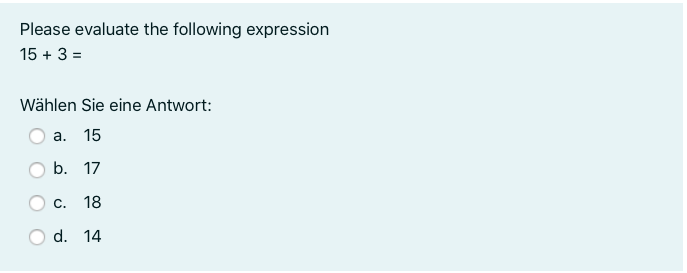
Free text answers
That is still too simple, let's do free text answers
tests.addQuestions('Arithmetic calculations free text',
50,
'shortanswer',
() => {
const a = RevealingMoodleTests.randomInt(1, 100);
const b = RevealingMoodleTests.randomInt(1, 100);
const c = a + b;
return {
text: `Please calculate the value of ${a} + ${b}`,
answers: [c.toString()]
}
})Generates 50 questions like the following example:

Cloze / complex questions
Finally, we can create cloze questions with multiple subquestions of different types
tests.addQuestions('Arithmetic calculations cloze',
50,
'cloze',
() => {
const a = RevealingMoodleTests.randomInt(1, 100);
const b = RevealingMoodleTests.randomInt(1, 100);
const c = a + b;
const factor = RevealingMoodleTests.randomInt(2, 5);
const d = c * factor;
return {
text: `Please add the numbers ${a} and ${b}
Result: {1:SHORTANSWER:=${a + b}}
Now multiply that result with ${factor}: {1:SHORTANSWER:=${d}}`
}
})Generates 50 questions like the following example:

Java Example 1: understand code exercise
Of course we can also create questions about much more complex domains Java Loops, sorry in German
tests.addQuestions('Java while loops', 20, "cloze", () => {
const varname = RevealingMoodleTests.randomChar();
const initval = RevealingMoodleTests.randomInt(2, 9);
const maxval = RevealingMoodleTests.randomInt(11, 33);
const incr = RevealingMoodleTests.randomInt(3, 6);
let i = initval;
let reps = 0;
while (i < maxval) {
reps += 1;
i = i + incr;
}
const finalval = i;
return {
text: `Betrachten Sie bitte die folgende Schleife:<br />
int ${varname} = ${initval};
while (${varname} < ${maxval}) {
${varname} = ${varname} + ${incr};
}
System.out.println(${varname});
Wie oft wird diese Schleife durchlaufen? {1:SHORTANSWER:=${reps}} Welcher Wert wird auf dem Bildschirm ausgegeben? {1:SHORTANSWER:=${finalval}}`
}
})Generates 20 questions like the following example:
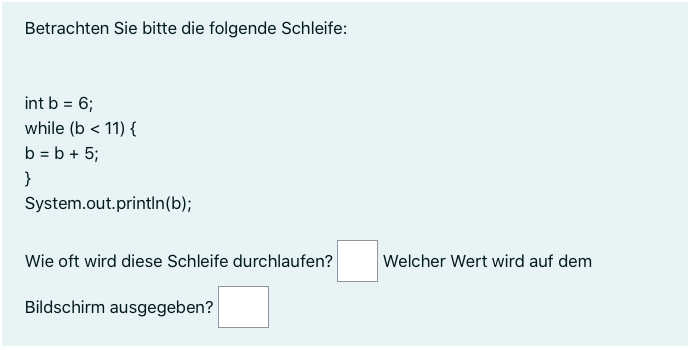
Java Example 2: Same exercise different domains
Or maybe the code for the exercise is quite the same but we want to vary domains
tests.addQuestions('Java for each loops', 20, "cloze", () => {
const domain = RevealingMoodleTests.randomElement([
{
'object': 'Book', 'collection': 'books',
'numericValue': 'pages', 'numericFunction': 'getPages()'
},
{
'object': 'Conference', 'collection': 'conferences',
'numericValue': 'participants', 'numericFunction': 'getParticipants()'
},
{
'object': 'Club', 'collection': 'clubs',
'numericValue': 'members', 'numericFunction': 'getMembers()'
}
]);
return {
text: `Consider a Java program that stores information about \
${domain['collection']}. You have a variable ${domain['collection']} \
of type List<${domain['object']}>. Each object of type ${domain['object']} \
has a method ${domain['numericFunction']} that returns the ${domain['numericValue']} \
of the ${domain['object'].toLowerCase()} as an integer. \
Complete the following code that adds up the ${domain['numericValue']} of \
all ${domain['collection']}:
int total = 0;
for({1:SHORTANSWER:=${domain['object']}} element : {1:SHORTANSWER:=${domain['collection']}})) {
total += {1:SHORTANSWER:=element.${domain['numericFunction']};}
}
System.out.println("Total: " + total);`}
})Generates 20 questions like the following example (there are less than 20 possibilities but any way):
